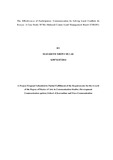Resource information
The general objective of the studywas to determine the effectiveness of participatory communication in addressing land Conflicts among communities in Kenya, specifically in Makueni county. The study sought to find out if the Makueni County Management Board had adopted participatory communication as a tool for addressing land conflicts as well as to determine the extent to which participatory communication methods adopted by Makueni County land management Board were effective and responsive to managing land conflict in the county.Participatory communication is a process that involves stakeholder engagement and empowerment in owning and driving social change through participation. Descriptive survey was undertaken targeting the overall population of Makueni county and the specific stakeholders who were directly and indirectly involved in addressing land issues in the community. The study concluded that participatory communication was used to involve people in the resolution of land conflicts at the Makueni county hinging on the ability to share perceptions, views, knowledge and a common purpose within and across the community. It entailed the identification of the conflict situation, engagement of the stakeholder groups and follow-through. The studyrecommends that when applying participatory approach to communication in land conflict resolution, it is important to first identify the root cause of the issue being addressed, the culture of the community, the appropriate change agent, the relevant key stakeholders and their respective roles, the aim of the exercise, timelines as well as monitoring and evaluation approaches required.


